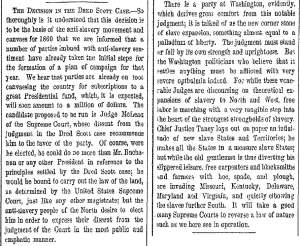Record Data
Transcription
THE DECISION IN THE DRED SCOTT CASE.-So thoroughly is it understood that this decision is to be the basis of the anti-slavery movement and canvass for 1860 that we are informed that a number of parties imbued with anti-slavery sentiment have already taken the initial steps for the formation of a plan of campaign for that year. We hear that parties are already on foot canvassing the country for subscriptions to a great Presidential fund, which, it is expected, will soon amount to a million of dollars. The candidate proposed to be run is Judge McLean of the Supreme Court, whose dissent from the judgment in the Dred Scott case recommends him to the favor of the party. Of course, were he elected, he could do no more than Mr. Buchanan or any other President in reference to the principles settled by the Dred Scott case; he would be bound to carry out the law of the land, as determined by the United States Supreme Court, just like any other magistrate; but the anti-slavery people of the North desire to elect him in order to express their dissent from the judgment of the Court in the most public and emphatic manner.
There is a party at Washington, evidently, which derives great comfort from this notable judgment; it is talked of as the new corner stone of slave expansion, something almost equal to a palladium of liberty. The judgment must stand or fall by its own strength and uprightness. But the Washington politicians who believe that is it settles anything must be afflicted with very severe opthalmia indeed. For while these venerable Judges are discoursing on theoretical expansions of slavery to North and West, free labor is marching with a very tangible step into the heart of the strongest strongholds of slavery. Chief Justice Taney lays out on paper an influx of new slave States and Territories; he makes all the States in a measure slave States; not the while the old gentleman is thus diverting his slippered leisure, free carpenters and blacksmiths and farmers with hoe, spade, and plough, are invading Missouri, Kentucky, Delaware, Maryland, and Virginia, and quietly elbowing the slaves further South. It will take a good many Supreme Courts to reverse a law of nature such as we here see in operation.






